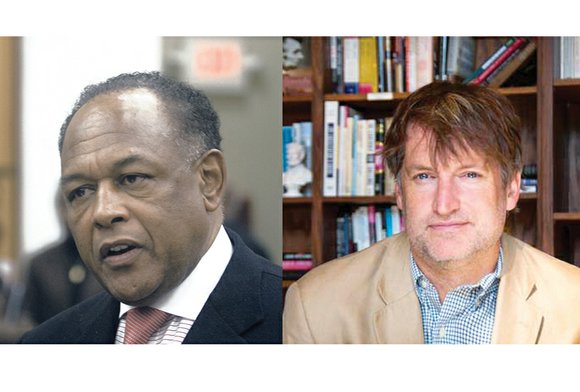‘Future Centers’ to help students with life after high school
Joey Matthews | 7/3/2015, 10:24 a.m.
Students in at least three of the city’s five comprehensive high schools will have new centers in their buildings this fall designed to help connect them to college and career opportunities.
They will be called “Future Centers,” and will launch later this year at three yet-to-be identified Richmond high schools.
The aim of the centers is “to lift lifetime earnings and transform the trajectory of our young people’s lives,” Mayor Dwight C. Jones said last Thursday at a summit marking the first anniversary of the Mayor’s Office of Community Wealth Building.
The centers will be dedicated spaces staffed with a coordinator to “engage students in planning their lives after high schools,” the mayor said to applause from about 150 people attending the summit at Martin Luther King Jr. Middle School in the East End.
The audience was comprised largely of state and local officials, educators, members of nonprofit organizations and community members.
The daylong event also featured panel discussions on themes such as education, employment and economic security, and the “My Brother’s Keeper Initiative” launched by President Obama in February 2014 to address opportunity gaps faced by boys and young men of color.
The Future Centers would help address a huge need at RPS, where currently each full-time high school guidance counselor faces the gargantuan task of serving 350 students, according to standards set by the Virginia Department of Education.
Mayor Jones said the centers are being funded by an initial city investment of $425,000 in RVA Future, a collaborative initiative between Richmond Public Schools and the nonprofit RPS Education Foundation. RVA Future is designed to help high school students in Richmond plug in to college and career training opportunities after they graduate.
The business community has donated another $110,000 to the initiative, the mayor added, nearly enough for a fourth Future Center, he said.
“Our long-term goal is to be in all high schools and to offer Promise Scholarships to all graduating students,” Mayor Jones added, so they can attend four-year colleges, community colleges or technical training centers.
He said the city is courting business leaders to fund the Promise Scholarship program, noting similar programs in Lynchburg and Pittsburgh.
J. Sargeant Reynolds Community College President Gary L. Rhodes spoke of his support for the program at the event.
He said Reynolds would offer associate degrees to RPS graduates, invest in scholarships for them and provide career coaches to the Future Centers.
The Future Centers are the brainchild of an anti-poverty commission formed in 2011 at the behest of Mayor Jones. The commission later was renamed the Maggie L. Walker Initiative for Expanding Opportunity and Fighting Poverty.
Dr. Thad Williamson, an associate professor at the University of Richmond, co-chaired the anti-poverty commission along with City Council member Ellen F. Robertson, 6th District. He took a leave of absence from his UR duties in 2014 to lead the Office on Community Wealth Building.
Staffed with two other full-time employees, his office also has backed the mayor’s efforts to expand workforce development, engage in targeted economic development, bolster early childhood development, redevelop public housing communities and establish a bus rapid transit route along Broad Street.
Mayor Jones noted $3.6 million is in the city’s budget for fiscal year 2016 for initiatives under the Maggie L. Walker initiative umbrella.
He also announced at the forum that he would seek to have the Office of Community Wealth Building become a permanent city department.
Dr. Williamson called the forum an important event because it “brings all the voices together” to further discuss ways to end poverty in Richmond. One in every four Richmond residents lives at or below the poverty level, according to the city.
He cited some examples of the city’s recent successes in alleviating poverty.
Dr. Williamson said the city’s Center for Workforce Innovation across from City Hall has reached its initial goal to provide more than 150 people with “quality employment opportunities” since it opened in November 2013.
He said 10 families have been enrolled in BLISS, or Building Lives of Independence and Self-Sufficiency, a program designed to provide “pathways out of poverty” for families. He said the group aims to enroll 10 more families by the end of the year.
He cited the work of the Affordable Housing Trust Fund, which was funded for the first time this year with nearly $1 million and is involved in five projects to develop or renovate 270 units of affordable housing.
Dr. Williamson also touted a $300,000 grant from the W.K. Kellogg Foundation in Battle Creek, Mich., that was announced last week to support the city’s early childhood development efforts.
“This city has a lot of things designed to help our youth,” said City Council President Michelle R. Mosby, who also is president and founder of the Help Me Help You Foundation designed to help ex-offenders re-enter the community.
“We have to make them aware of it and get them to it,” she added.
Arthur Burton, executive director of Kinfolk Community in the Mosby Court public housing community in the East End, was more blunt.
“We don’t really need you folks to give us anything, really, but give us some money,” he said, as the audience applauded.
He said there are so many children and adults in public housing communities who could reach their full potential if only the proper resources were provided to help them.







